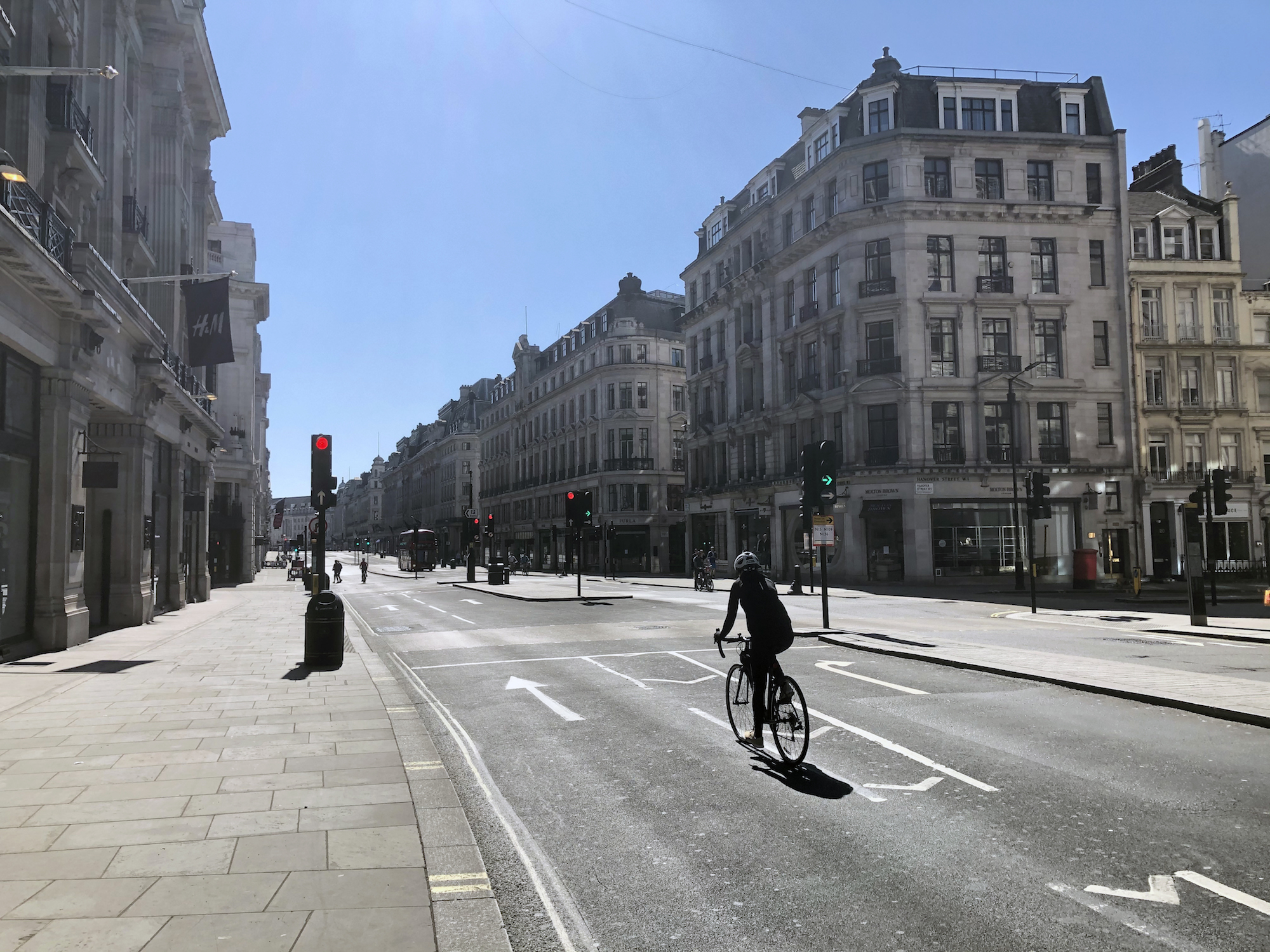'You need two things to get people cycling in this country, funding and political will,' says bike mayor
Adam Tranter argues the money had already been promised months ago, but the change in messaging is a step in the right direction

Cyclist in London (Photo by Rahman Hassani/SOPA Images/LightRocket via Getty Images)
One of the initial beneficiaries of the coronavirus pandemic appeared to be the bike industry, with Halfords reporting "very strong" sales as its share price soared by 23 per cent, with people rushing to dig their old bikes out of their sheds in order to go for their allocated exercise/freedom during lockdown.
However, as much as it has become a new past-time the general public has rekindled to try and enjoy the early hints of summer weather, it now appears cycling will form part of the plan for society to try and return to normality during the crisis.
Transport for London says cycling could increase tenfold in the aftermath of the lockdown and the UK government announced on Saturday a series of measures to encourage people to travel by two wheels before scenes of packed tube platforms emerged the day after Prime Minister Boris Johnson launched his plans for easing lockdown.
Transport Secretary Grant Shapps had announced £2bn in funding to support safer cycling transport, creating, pop-up bike lanes, wider pavements, safer junctions, and cycle and bus-only corridors within weeks. Fast-tracked statutory guidance was also published for councils to reallocate road space for significantly-increased numbers of cyclists and pedestrians.
>>> 16-year-old cyclist left critically injured after being hit by two cars
However, the Bicycle Mayor of Coventry, Adam Tranter, says the money had already been promised months ago, yet the speed with which it will be invested as well as the change in messaging surrounding getting people cycling, is a step in the right direction.
"In my view, the £2bn is not the story here from today's announcement from Grant Shapps; it's previously announced cash (launched in February, the funding figure is to be spread over five years)," says Tranter.
The latest race content, interviews, features, reviews and expert buying guides, direct to your inbox!
"What is game-changing, however, is the speed of implementation for the initial £250m, statutory guidance to councils, (teased) presumed liability law and long-term budget planning.
"And, of course, the apparent political will. I'm always cautious about this, but today seemed different. A sense of urgency and purpose we've rarely experienced in active travel," Tranter said.
This sentiment was echoed by former Olympian Chris Boardman, who told Cycling Weekly: "More important than cash, the government has given cycling as a mode of transport a new status, not for ideological reasons but for practical ones, it’s the most logical solution to short-term problems and then, if we choose, it’ll help us tackle long-term ones.
"We have never seen anything like this before, it is a step-change in the Government’s position that should not be underestimated."
If presumed liability is made law in the UK, as it already is in many countries in Europe, it would mean the larger vehicle is automatically at fault in a collision unless they can prove otherwise. "Simply, it changes the hiearchy of our streets," explains Tranter.
"In my opinion, you need two things to get more people cycling in this country: funding and political will, and today we saw a bit of both.
"Is it enough money for active travel? No, it's not," Tranter continues, then telling the Guardian in an interview that £6 billion is more along the lines of the figure needed to create lasting change.
"Britain’s cycling revolution will be created by people of all backgrounds and sizes, in jeans and a t-shirt, and at about 9mph. It shouldn’t be the likes of Team Ineos’s Chris Froome and Geraint Thomas telling people to #GetPedalling that will lead the change, but ordinary people," he argues.
"68% of journeys are under five miles. A quarter of journeys by car are under one mile. Not all journeys need to be cycled or walked but so many can be."
Jonny was Cycling Weekly's Weekend Editor until 2022.
I like writing offbeat features and eating too much bread when working out on the road at bike races.
Before joining Cycling Weekly I worked at The Tab and I've also written for Vice, Time Out, and worked freelance for The Telegraph (I know, but I needed the money at the time so let me live).
I also worked for ITV Cycling between 2011-2018 on their Tour de France and Vuelta a España coverage. Sometimes I'd be helping the producers make the programme and other times I'd be getting the lunches. Just in case you were wondering - Phil Liggett and Paul Sherwen had the same ham sandwich every day, it was great.